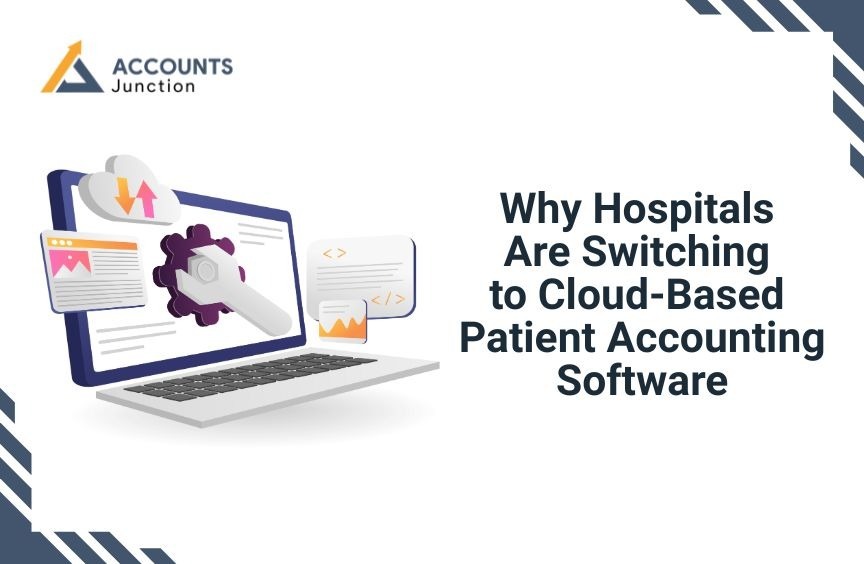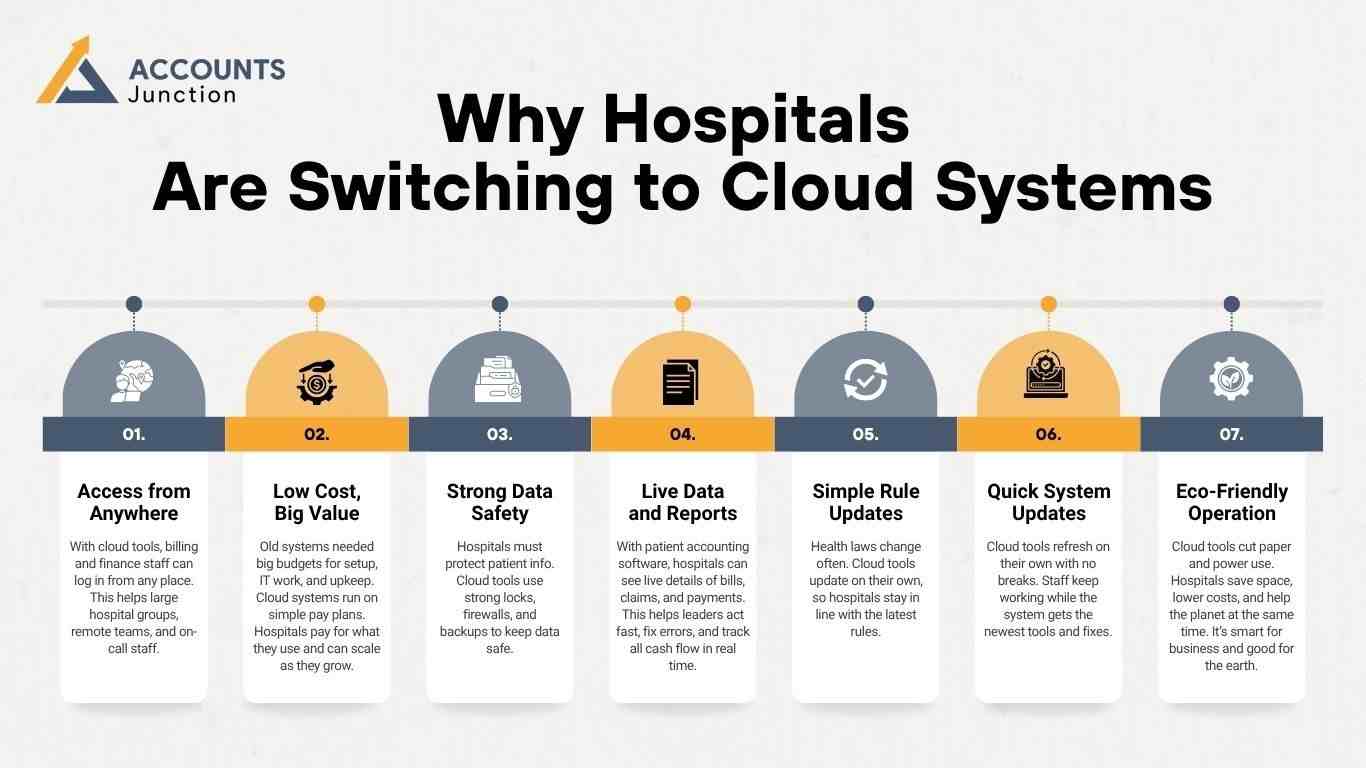
Why Hospitals Are Switching to Cloud-Based Patient Accounting Software
The Healthcare field is changing fast. Many hospitals now move their data and billing work to the cloud. One key shift is in hospital accounting and payment systems. More healthcare centers now use cloud-based patient accounting software to make their work quick, safe, and simple.
This change is not just to cut costs. It helps with smoother pay, better care, and smart use of data. In this blog, we’ll look at why hospitals choose cloud systems, how this software works, and how it helps both hospitals and patients stay ahead.
What Is Patient Accounting Software?
It is a digital system that helps hospitals and clinics handle billing, claims, and payments. It connects all financial data related to patient care in one place.
-
Why It’s Important
In the past, most hospitals used paper or local computers to track bills and payments. This old way was slow and full of errors. Cloud-based systems fix these problems. They store data safely online and let teams access it from anywhere.
This simple change saves time, cuts costs, and makes hospital finance more accurate.
From Old Systems to the Cloud
Hospitals have long used old-style accounting tools. But those tools now seem slow and stiff next to new cloud-based systems.
How Old Systems Worked
Old systems kept records on local drives. Only a few users could reach the files. Each update, backup, or fix had to be done by the IT staff by hand.
Problems with the Old Way
- Staff could not check data when outside the hospital.
- Data could be lost if the drive failed.
- Updates took time and raised costs.
- Billing was slow to process.
The Cloud Change
Cloud-based patient accounting software runs online and keeps data on safe, remote servers. Staff can log in from any device. Hospitals now enjoy quick updates, smooth data flow, and high data safety in one place.
Why Hospitals Are Switching to Cloud Systems
Hospitals want tools that help them work smart and fast. Cloud-based patient accounting software makes that possible.
1. Access from Anywhere
With cloud tools, billing and finance staff can log in from any place. This helps large hospital groups, remote teams, and on-call staff.
It also supports telehealth, where doctors can check patient data during online visits.
2. Low Cost, Big Value
Old systems needed big budgets for setup, IT work, and upkeep. Cloud systems run on simple pay plans. Hospitals pay for what they use and can scale as they grow.
This saves money and gives more freedom in how funds are used.
3. Strong Data Safety
Hospitals must protect patient info. Cloud tools use strong locks, firewalls, and backups to keep data safe.
Even if a device fails, the data stays secure online. This is safer than local servers.
4. Live Data and Reports
With patient accounting software, hospitals can see live details of bills, claims, and payments.
This helps leaders act fast, fix errors, and track all cash flow in real time.
5. Simple Rule Updates
Health laws change often. Cloud tools update on their own, so hospitals stay in line with the latest rules.
This reduces mistakes and helps avoid costly fines.
6. Quick System Updates
Cloud tools refresh on their own with no breaks. Staff keep working while the system gets the newest tools and fixes.
This saves time and keeps the system safe and fast.
7. Eco-Friendly Operation
Cloud tools cut paper and power use. Hospitals save space, lower costs, and help the planet at the same time. It’s smart for business and good for the earth.
Key Features of Cloud-Based Patient Accounting Software
Good software should make life easy for staff and patients alike. Here are some main features hospitals prefer in patient accounting software.
1. Automated Billing
Automation saves time and reduces errors. Bills are created right after a patient is discharged. Claims go to insurers fast, and payments are processed with fewer delays.
2. Linked Patient Data
The system links patient visits, treatments, and bills. This removes confusion and helps the finance team see a full picture.
3. Reports and Dashboards
Smart dashboards show clear insights into income, unpaid claims, and trends. Managers can track hospital performance in real time.
4. Safe Cloud Storage
All data stays in the cloud with strong encryption and regular backups. Only approved staff can access it.
5. Custom Fit for Any Hospital
Every hospital is different. Cloud systems can be adjusted to fit small clinics or large hospitals. They grow as your needs grow.

How the Cloud Improves Hospital Workflow
Switching to cloud-based patient accounting software improves the whole hospital process.
1. Faster Billing
Bills are created in minutes instead of hours. This helps both patients and the finance team.
2. Less Paperwork
Since all data is digital, staff no longer need to handle piles of files. They spend more time with patients instead of paperwork.
3. Smooth Teamwork
Departments can share data in real time. Finance, billing, and care units stay in sync, even across different hospital branches.
4. Fewer Errors
Automation checks details before sending claims. This cuts down on rejected or delayed payments.
Benefits for Patients
The benefits of patient accounting software go beyond hospital staff—it also helps patients directly.
1. Clear and Fair Billing
Patients can see detailed bills and insurance status online. They know exactly what they are paying for.
2. Faster Discharge
No one likes waiting for bills to be processed. Cloud-based systems make discharge faster by creating invoices instantly.
3. Easy Communication
Hospitals can send updates, payment reminders, or reports through secure portals. This keeps patients informed and engaged.
Common Challenges and Their Fix
Switching to a cloud system can bring small challenges at first. But with planning, they can be solved easily.
1. Data Transfer
Moving old records to a new system takes time. A step-by-step plan and expert support can make the process smooth.
2. Staff Training
Some staff may need time to learn new tools. Regular training and hands-on sessions can help them adapt fast.
3. Internet Need
Cloud software needs a steady internet link. Most systems now come with offline options to handle short outages.
Once these early steps are done, hospitals enjoy faster and easier operations.
The Future of Patient Accounting Software
The future of patient accounting software looks bright. New tech is making it even smarter and more useful.
1. AI and Machine Learning
AI can help find errors, predict claim results, and guide billing teams to collect payments faster.
2. Link with Telehealth
As online care grows, cloud systems will link billing directly with telehealth services for easy payments.
3. Shared Access
Hospitals, insurers, and patients will soon share and check data safely in real time. This will make the whole system more open and efficient.
Why Cloud Systems Are the Future
The move to cloud tools is not just a short-term trend but it’s the path to long-term success.
Hospitals Industry that use patient accounting software gain more than better billing; they set the base for growth, new tech, and stronger patient care.
Here’s how cloud systems shape the future of healthcare:
-
Smart Insights with Real Data
- Cloud tools give live reports that help leaders make quick choices.
- Real-time trends help track income, costs, and patient flow.
- This leads to smarter planning and more control.
-
Easy Link with Other Systems
- Cloud setups can link with EHR, lab, and pharmacy systems.
- This keeps all patient data in one safe space.
- It saves time and stops double entry or missing information.
-
Better Care for Patients
- Staff spend less time on billing and more time on care.
- Clear bills and faster claims make patients happier.
- Hospitals can use data to spot care gaps and improve service.
-
Stronger Remote Work Options
- Cloud tools make remote work simple for finance and admin teams.
- Staff can log in from home, clinics, or other branches.
- This builds better teamwork and keeps work moving at all times.
-
Ongoing Tech Growth
- Cloud systems grow with new tools like AI and automation.
- This helps hospitals handle tasks faster and reduce manual work.
- As tech grows, cloud systems stay ready for the next update.
-
Better Use of Funds
- Cloud tools free hospitals from large IT costs.
- Money saved can go toward new care units or patient services.
- This keeps the focus on care, not system upkeep.
Whether you need back-office support or billing and claims services, Accounts Junction provides full finance solutions. Our certified team keeps your accounts accurate, fast, and compliant. Partner with us and enjoy smooth finances while you focus on patient care and growth.
FAQs
1. Why are hospitals using cloud systems now?
They want faster access, fewer costs, and safer data storage.
2. Is cloud-based patient accounting software safe?
Yes. It keeps data secure with locks, codes, and backups.
3. Can small clinics use it too?
Yes. It fits both small and big healthcare centers.
4. How does it cut hospital costs?
It runs online, so no need for servers or high IT costs.
5. Does it need the internet all the time?
Mostly yes, but many apps work offline for short breaks.
6. Can hospital staff use it from home?
Yes. They can log in safely from any approved device.
7. How does it help with billing?
It creates bills fast, sends claims, and tracks payments.
8. Will data get lost if a system crashes?
No. Cloud backups keep all files safe and easy to restore.
9. How long does setup take?
Small setups take weeks. Bigger hospitals may take a few months.
10. Is training needed for staff?
Yes, but it’s simple. Most staff learn within days.
11. Does it reduce billing mistakes?
Yes. It checks data before sending claims to insurers.
12. Can hospitals track unpaid claims?
Yes. The system shows pending bills and payment updates.
13. Does it follow healthcare laws?
Yes. Cloud providers meet HIPAA and data safety rules.
14. How does it help teamwork?
It lets finance and care teams share info right away.
15. Is it costly to start?
No. It works on a low monthly or yearly fee.
16. What about hospitals with many branches?
All branches can log in and use the same system online.
17. Do patients get any benefit?
Yes. They see clear bills, faster checkout, and easy payments.
18. What should hospitals check before buying?
Easy use, security, reports, and good support.
19. What’s next for patient accounting software?
It will use AI to make billing and payments even faster.
